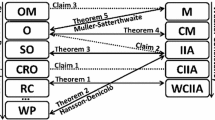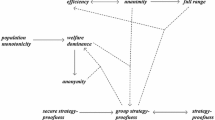Summary.
If only the strict part of social preference is required to be transitive then Independence of Irrelevant Alternatives implies that there is a coalition containing all but one individual that cannot force x to be socially ranked above y for at least half of the pairs of alternatives (x,y).
Similar content being viewed by others
Author information
Authors and Affiliations
Additional information
Received: August 29, 1996; revised version: March 24, 1997
Rights and permissions
About this article
Cite this article
Campbell, D., Kelly, J. Quasitransitive social preference: why some very large coalitions have very little power. Economic Theory 12, 147–162 (1998). https://doi.org/10.1007/s001990050214
Issue Date:
DOI: https://doi.org/10.1007/s001990050214




